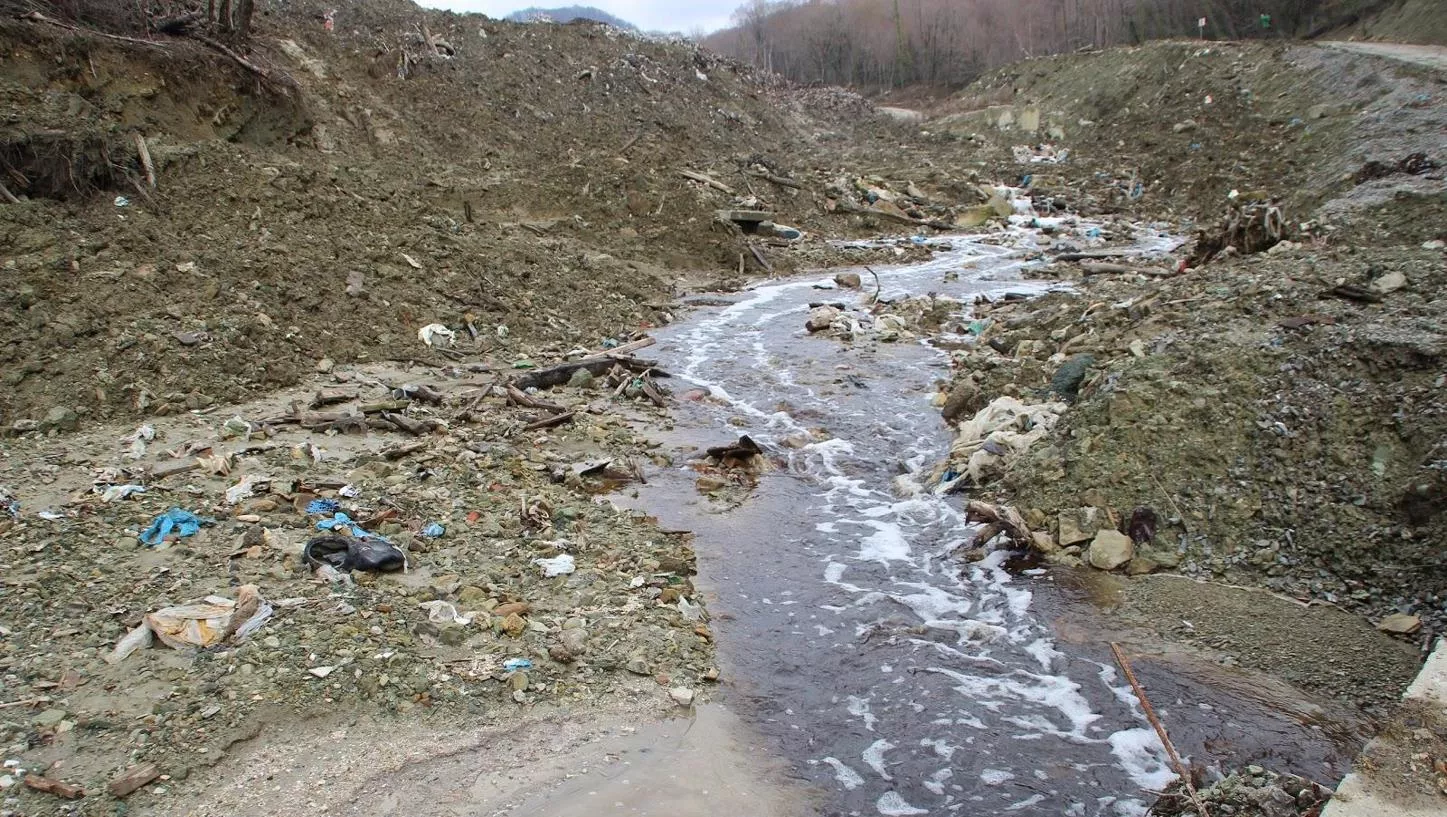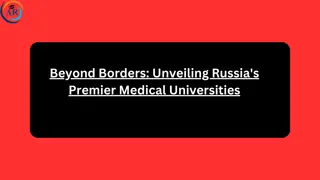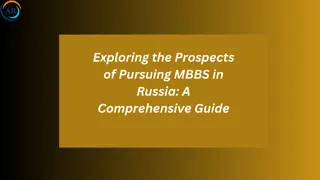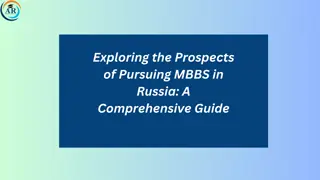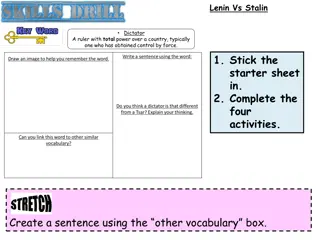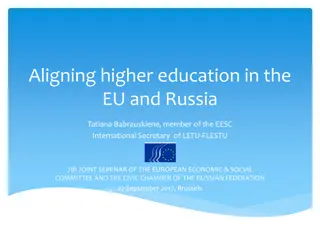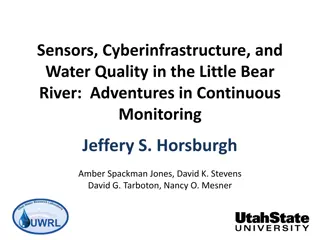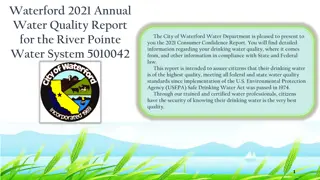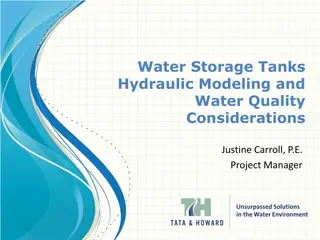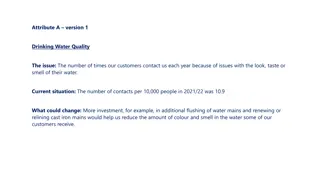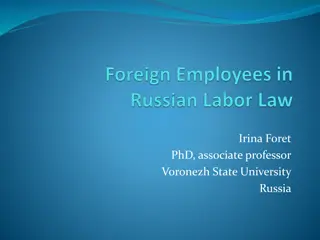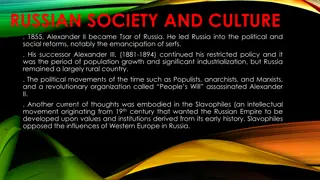Water Quality in Russia: Challenges and Case Studies
The water quality issues in Russia are multifaceted, with industrial and military pollution, radioactive contamination, and oil spills posing significant environmental threats. Policy conflicts, aged infrastructure, and historical legacies contribute to the complexities of addressing water quality in the country.
Download Presentation

Please find below an Image/Link to download the presentation.
The content on the website is provided AS IS for your information and personal use only. It may not be sold, licensed, or shared on other websites without obtaining consent from the author.If you encounter any issues during the download, it is possible that the publisher has removed the file from their server.
You are allowed to download the files provided on this website for personal or commercial use, subject to the condition that they are used lawfully. All files are the property of their respective owners.
The content on the website is provided AS IS for your information and personal use only. It may not be sold, licensed, or shared on other websites without obtaining consent from the author.
E N D
Presentation Transcript
Water Quality in Russia Background and case studies Jordan Duffy, Parker Forsley, and Jenny Bower image credit: http://sochiwatchdotorg.files.wordpress.com/2013/03/img_4490.jpg
Water Quality in Russia Policy Relationship between government and science Water quality impacts Industrial/military pollution Hydropower Sochi Water availability Clean Water Program
Environmental policy Ministry of Natural Resources and Environment conflict of interest environmental issues have low priority private interests and public interests intertwined Gryzlov & Petrik public officials have ties to companies w/governmental contracts natural resources shadow economy Russian Academy of Sciences dissolved in 2013 Mikhail Kovalchuck
Industrial and military pollution Soviet legacy: pollution environmental contamination not a concern led to 40% of Russian territory facing moderately high to high ecological stress Current contamination 75% of surface water 50% total water 30% groundwater Aging/obsolete infrastructure Pollutants Heavy metals Dioxins Fertilizers Oil Chemical weapons Radioactive waste from weapons
Radioactive rivers In 1948, nuclear weapon production starts at Chelyabinsk-40 along the Techa River in the southern Ural mountains. diluted effluent dumped straight into the river (2.75 million curies between 1949- 56) contained high levels of Strontium-90 and Cesium-137, with half lives of 30 years Primary water source for residents along river. 28,000 exposed to high levels of radiation In 1951 Soviet scientists discovered high levels of radiation along river banks -effluent disposal moved to nearby Lake Karachay which contained no inlets or outlets. -drying of lake causes dust to spread. September 29, 1957: cooling system of reservoirs fails explosion resembling ammonium nitrate bomb occurs, fallout cloud spreads hundreds of kilometers. 10,000+ residents evacuated with no explanation
Oil spills Russia accounts for 12% of the world's oil production and near 50% of the total oil spills with approximately 20,000 per year. Approximately 30 million barrels of oil spilled annually. ~4 million barrels flow straight into the Arctic Ocean. Russian authorities claim there are only hundreds of inland spills per year. According to Russian law, spills less than 56 barrels do not need to be reported. Government often turns a blind eye to many oil spills. Either ignoring fines or drastically reducing them. Emergency and spill response tools are not often enforced. As Arctic sea ice recedes, oil spills become more of a looming threat. Conditions in these drilling sites are unpredictable, floating icebergs, etc. Response team would be far too slow and there is currently no technology effective at cleaning oil spills in ice conditions.
photo credit: Greenpeace Oil-contaminated rivers in the city of Usinsk
Over 1,200 miles from Arctic Research and Design Center for Offshore Developments (ARC). ARC is responsible for monitoring and preventing emergency situations.
Hydropower 16% of electricity generated by hydropower ranked 5th in the world for hydroelectricity production Export to China China Yangtze Energy + EurSibEnergo 100 billion kW hours supplied over next 25 years Negative effects Resettlement Poor oversight and regulation Sayano Shushenskaya accident: 75 dead Uncleared reservoirs; ecological harm Some located in seismically active zones
Sochi impacts strong ties between contractors and government hasty environmental assessment green construction standards = post-construction bandaid repression of protesters construction affected over 8,000 acres of Sochi National Park protected zones water contamination due to illegal landfill dumping clearcutting destruction of wetlands pollution of Mzytma, Laura, and Achipse rivers increased turbidity, arsenic levels vulnerable salmon population
Problem areas Volga and Dnepr rivers sewage, eutrophication Volga spontaneously ignited in 1970 Baltic, Black, Caspian seas sewage, flooding of Caspian Black Sea contains only 5 species of fish; only 10% of volume contains enough oxygen to support aquatic life Lakes Baikal, Ladoga, Onega heavy metals, radioactive military waste, fertilizers, chemicals, sewage St. Petersburg, Moscow disease from polluted waters
Water availability Aging/obsolete infrastructure rusting pipes 40% of system needs refurbishment Giardia in St. Petersburg Cholera, brown water in Moscow Large number of untreated wastewater effluents in 2004, only 10.6% of wastewater was treated according to regulations 25% of world fresh water neglected, polluted
Clean Water Program Initiated in 2006 -> Plans to run through 2017 331.8 billion roubles (10 billion USD) Aims to bring clean water to public institutions Federal government will fund up to 60%, remaining from regional and municipal Resented by Russian scientific community Viktor Petrik s filters (nanotechnology) were chosen to use on the pilot project Petrik s filters were abandoned and program revised in 2011
Pure Water Federal Target Program Supply population with quality freshwater, introduce modern technologies --- 2011->2017 produce light steel tubing, non- corrosive for 100 years repair all existing pipelines wastewater treatment, combine UV and ultrasound disinfectant wastewater for space heating
Activism Environmental Watch of North Caucasus (EWNC) Sochi activists Vitishko and Gazaryan arrested for swearing in public Eco-blogger trying to publicize the orange chemical sludge beaten in public Greenpeace Arrested for protest banners
References http://countrystudies.us/russia/25.htm https://www.chinadialogue.net/article/show/single/en/5384-Russia-s-Siberian-dams-power-electric-boilers-in- Beijing http://www.waterworld.com/articles/wwi/print/volume-26/issue-4/regulars/creative-finance/russian-water-and- wastewater-market.html http://www.nprvo.ru/en/water/program/ http://www2.epa.gov/international-cooperation/epa-collaboration-russia http://www.greenpeace.org/australia/PageFiles/480942/Point_Of_No_Return.pdf http://newamericamedia.org/2013/10/behind-russia-vs-greenpeace-furor-unreported-oil-pollution-of-the-arctic.php http://upload.wikimedia.org/wikipedia/commons/thumb/b/ba/EPNZ_1-3_oil_and_gas_areas.png/640px-EPNZ_1- 3_oil_and_gas_areas.png http://ewnc.org/files/sochi/Doklad-Sochi-2014_EWNC-Eng.pdf







